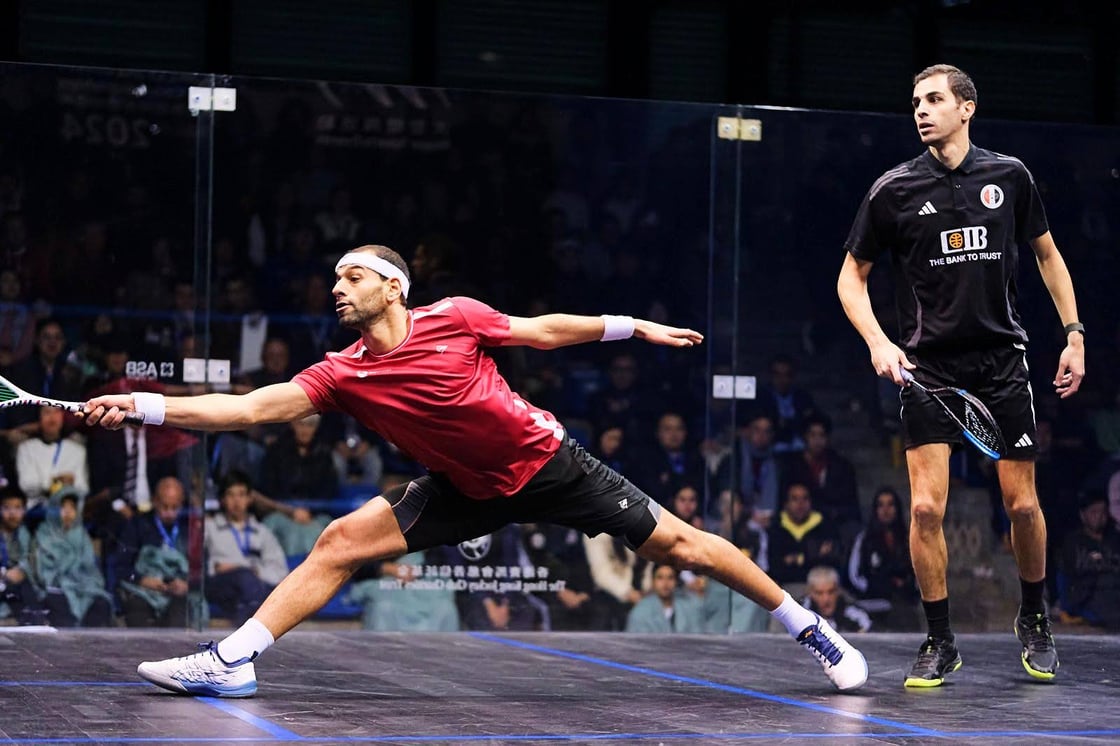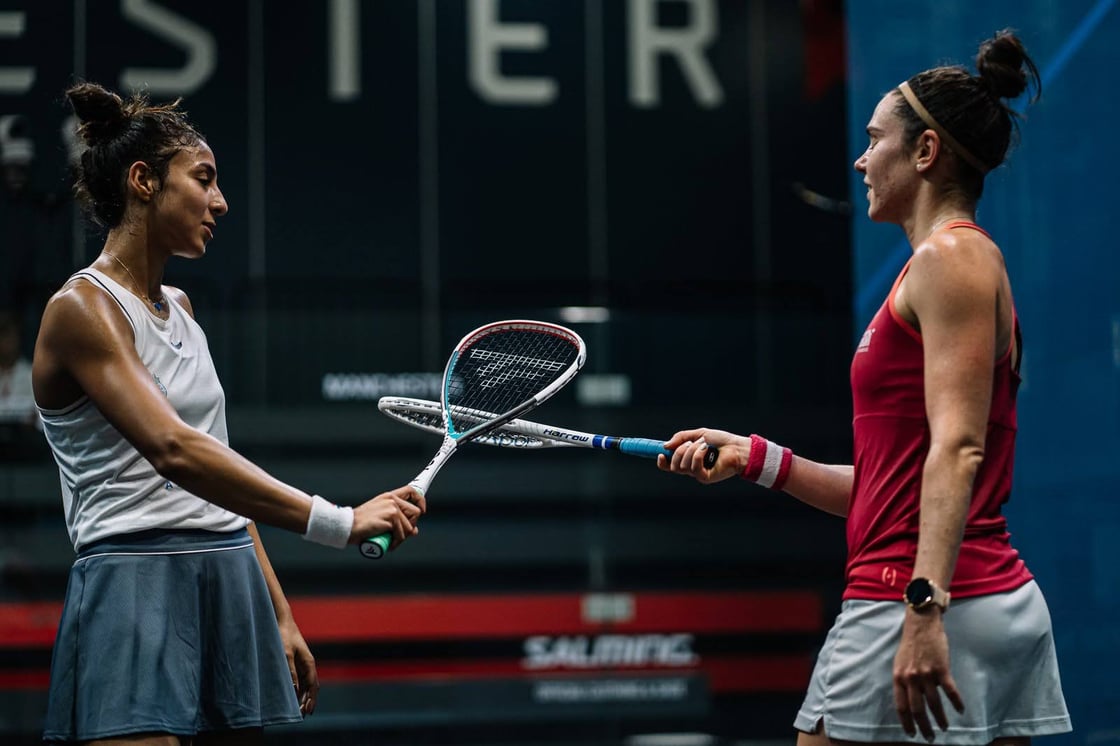If you play squash, there is a 100% likelihood that you will come up against somebody better than you.
As they say, there's always a bigger fish!
However, it's easy to forget that these matches are the ones that will help you learn and improve the most as a player, so it's vital to use them to your advantage as much as you can.
This week, I thought I'd go through 6 tips for facing a better player.
Before I dive in, I want to clarify for context, when I talk about a 'better player' in this week's newsletter, I don't mean somebody who is slightly better than you who has perhaps beaten you more than you've beaten them.
I'm talking about somebody who is a considerable level above you, someone who you really don't have much of a chance of beating at all (as negative as that may sound).
The rest of the newsletter will be more positive, I promise...
1. Dial In Your Mindset
There are two paths you can go down when it comes to playing a better player, and you make your decision on which path you choose before you even step on the court.
You might tell yourself, “What’s the point if I’m just going to lose?” but that kind of thinking guarantees you’ll walk away empty-handed.
Instead, you need to flip your perspective: this is not about winning the match, it’s about winning moments, pushing yourself, and squeezing as much as you can from the experience.
The key shift is to stop worrying about the overall result and try to get your mind in gear, thinking about what your focuses should be during the match.
Can you push them in a rally?
Can you win a point with a clever serve, or by extending a rally until they make a mistake?
Can you put them under enough pressure to maybe even steal a game?
These are the little victories you can realistically aim for, even against a much stronger opponent, and they’re incredibly valuable for your growth as a player.
Stepping on the court with this mindset also frees you up to play your best squash.
When you’re not weighed down by the expectation to win, you can experiment more, trust your shots, and take calculated risks, things that are often harder to do when you’re locked in a tight, winnable match.
You can learn a lot about how your game holds up under pressure, where your weaknesses really are, and how a higher-level player exploits them.
Finally, remind yourself that just being on court with someone that strong is a gift, don't go on court with that negative mindset of 'let's get this over with', instead think 'let's learn from this'.
You’ve got the chance to get a firsthand look at what higher-level squash feels like: the pace, the accuracy, the decision-making.
Every point you're going to play will sharpen your awareness, every mistake you make will teach you something, and every small success you have boosts your confidence.
So, dial in your mindset before you even step on court: it’s not about the win, it’s about the opportunity.
2. Prepare For A Fast Start
One of the first things you’ll notice when you face a considerably better player is the sheer pace they bring to the game, not just in terms of how hard they hit the ball, but how quickly they move, how fast they reset, and how relentlessly they apply pressure.
If you walk on court cold, or spend the first few rallies “feeling your way in,” you’re likely to be buried before you even settle.
That’s why preparing for a fast start is absolutely crucial.
Before the match even begins, get your body and mind fully switched on. Warm up properly, not just physically, but mentally (like I touched on before).
Visualise the kind of intensity you’ll need.
A better opponent is often going to want to make the match fast and try to get you off court quickly. They're likely to come out guns-a-blazing, so you need to be ready for that!
Remind yourself that the first few points (and even the way that you warm up) will set the tone, and if you can at least show you’re ready to fight, you’ll earn respect and give yourself a foothold.
You might not win the opening exchanges, but you can make them competitive and show that you're not going to roll over and give up easily.
When the match starts, resist the urge to play passive squash just to “get into it.”
A better player will eat that up.
Instead, aim to be proactive from the very first rally. Take the ball early, hit with purpose, and move with urgency.
Even if you make a few mistakes, it’s better than playing tentatively and giving them total control. Remember, they’re expecting to dictate, so any early signs that you’re going to make them work harder than expected can slightly rattle their rhythm.
Another benefit of preparing for a fast start is that it helps you settle.
If you can string together a few tough rallies or sneak an early point, your confidence will rise and you’ll feel more engaged.
And who knows, perhaps they went too explosive too fast, and, maybe you can surprise them enough to grab a few points or even a game before they fully find their groove.
The bottom line? Don’t treat the opening minutes as warm-up time.
Against a stronger opponent, you need to hit the ground running!
3. Focus On The Basics
When you’re up against a considerably better player, it can be tempting to try fancy shots, risky winners, or trick plays to “catch them out.”
But the truth is, they’ve probably seen it all before, and unless you’re extremely precise, they’ll punish any loose or low-percentage attempts.
That’s why one of the most valuable things you can do in these matches is double down on the basics.
This is your chance to see how solid your foundation really is.
How reliable is your length game? Can you consistently hit deep, tight drives that push your opponent behind you or force a weaker reply?
A stronger player will expose any inconsistencies here, if your length is too short, they’ll attack. If your width is loose, they’ll cut it off and counter.
Treat this as a test, focus on hitting your targets, and pay attention to where they break down under pressure.
This is a great way to identify weaknesses in your own game.
Once you’re controlling the basics better, length, width, and recovery, you may find you can actually create your own opportunities.
Watch carefully. When you’ve forced a slightly loose ball or a weak shot, that’s the moment to go for something more aggressive.
You don’t need to force winners out of nowhere, you need to build the point and take your chances at the right time.
This not only makes you a smarter player, but it also earns you respect from your opponent, they’ll notice you’re constructing rallies well, not just scrambling or hoping for mistakes.
In short, don’t think of these matches as a chance to show off your best/favourite shots.
Think of them as a chance to measure your basics under serious pressure. Strong foundations are what allow you to stay competitive, even against players much higher up the ladder.

Photo credit: Steve Cubbins
4. Analyze, Adapt, And Work On Your Strategy
One of the most valuable parts of playing against a much better player is that they force you to think strategically.
If you just go on court and play the same way you always do, without any adjustments, they’ll simply pick you apart.
But if you actively try to analyze what’s happening and tactically adapt your approach, you can turn the match into a powerful learning experience.
Start by paying close attention to what’s working (even just a little) and what’s failing.
Are they pouncing on your cross-courts? Maybe you need to keep it straighter.
Are they attacking when you lift the ball too much? Perhaps you should work on lowering your trajectory.
You won’t suddenly figure out a “winning strategy”, remember, they’re a level or two above you, but you can experiment with small tactical adjustments to see how they affect the flow of the game.
You might be more likely to get a few points out of it!
Remember, a squash match is constantly changing. Against a better player, they'll spot that you're changing your tactics, then they'll change their own to adapt.
Then it's your turn to do the same.
This is also the perfect moment to test out different types of serves, returns, or rally patterns.
Can you change the pace or angle to disrupt their rhythm? Can you spot any habits or patterns they rely on and try to counter them?
Even if these adjustments only help you win a few extra points, they sharpen your tactical thinking, and that’s a skill you can carry forward into matches against players at your level.
Most importantly, don’t get stuck in one mindset just because you’re losing.
Keep asking yourself, “What can I try differently?” Sometimes, just making your opponent slightly uncomfortable or forcing them to change their game plan is a small victory in itself.
Also, note that these tactics and strategies sometimes take time to take effect, especially if you're trying to wear your opponent down a bit. Don't expect easy points fast!
But, in short, treat these matches as a live strategy workshop. Analyse, adapt, and experimentm you’ll come away a smarter player, even if the scoreboard doesn’t reflect it.

Photo credit: Steve Cubbins
5. Limit Unforced Errors
It can certainly be tempting to go for winners, especially if you're down in the game or match so far. Many players use this as a kind of last ditch effort to get some points on the board.
But, in the grand scheme of things, is it really worth the risk?
I'd say no.
When you’re facing a stronger opponent, one of the biggest gifts you can give them is handing over easy points through unforced errors.
Hitting tins, clipping the side wall, or spraying the ball out under no real pressure, all of these simply speed up your opponent’s win without making them work for it.
And when you’re trying to improve, that’s the exact opposite of what you want.
Instead, focus on playing clean, solid squash.
You can still attack and look for opportunities, especially when you’ve worked the rally well and forced a weak return, but be disciplined about when you go for low-margin shots.
Make your opponent have to earn their points by keeping the ball tight, deep, and consistent.
Also, remember that better players thrive when you play rashly.
They know you’re under pressure, they know you’re tempted to take wild risks, and they’re waiting to punish you for it.
But if you show that you can hold your focus and avoid giving away free points, you’ll actually make life a little harder for them.
Again, you might not win the match, but you’ll push them to hit better shots and force them to work through the rallies properly.
Limiting unforced errors isn’t just about playing safer, it’s about respecting your own game.
It helps you build resilience, stay mentally composed, and sharpen your decision-making under pressure. That’s the kind of growth that pays off in every match you play, not just the tough ones.
6. Reflect & Learn
Once the match is over, your work isn’t done, this is where some of the most valuable progress happens... as cliche as it sounds.
It’s tempting to just walk off court, shrug, and say, “well, they’re better than me, nothing I could do.” But that attitude misses a huge opportunity for growth.
Especially if you did put a lot of effort into the match at hand.
Take some time after the game to reflect honestly on what happened.
Where did you struggle the most? Was it handling their pace? Reading their deception? Keeping your shots tight under pressure?
Think about the points where you actually managed to put them under some pressure or win rallies and what worked for you.
These kinds of reflections can help you identify the specific areas of your game that need attention.
Maybe you realised your length shots weren’t consistent enough, or that you panicked and rushed decisions when under pressure.
Maybe you noticed that when you did stick to your strategy and worked the rally, you were able to hold your own for longer.
It can also help to talk to your opponent or ask a coach or teammate who watched the match for feedback. Better players often have insights they’re happy to share, and even small pointers can help you adjust your training or mindset going forward.
Most importantly, don’t let a tough loss knock your confidence.
Facing stronger opponents is one of the fastest ways to improve, if you take the time to reflect, learn, and apply those lessons in your next practice or match.
Over time, you’ll notice those gaps closing against certain players and you'll find yourself at another step up the ladder on your squash journey!
This article was taken from our On The 'T' Newsletter, if you're interested in receiving more content like this, please feel free to sign up using the subscribe section located at the bottom left of this page (or underneath the article if you're on mobile), thanks!
